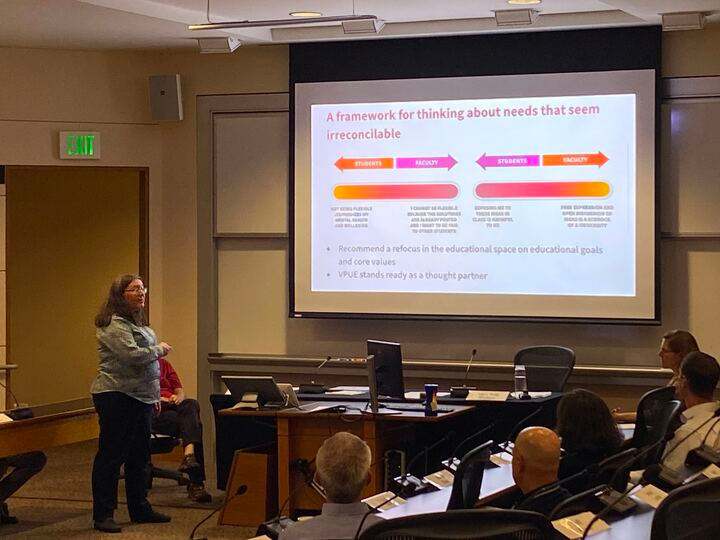I am cautiously looking forward to the formation of the search committee tasked to find the University’s next Vice Provost of Undergraduate Education (VPUE). The committee, as announced by the Stanford Report on Oct. 20, is going to be “formed as soon as possible.”
Thinking of an administrative position that has more of a direct impact on undergraduates’ classroom experiences is difficult, to put it lightly. I would be surprised if there were any undergraduates that have not interacted with just some of the numerous offices and programs under VPUE: such as Academic Advising, Program in Writing and Rhetoric (PWR), Structured Liberal Education (SLE), Bing Overseas Study Program (BOSP), Frosh 101, Ways of Thinking/Ways of Doing (WAYS) and Civic, Liberal, and Global Education (COLLEGE). Throw a figurative stone at any undergraduate-related office and you’ll likely hit one overseen, at least in part, by VPUE.
The immense power that VPUE wields over undergraduates should serve as a loud wakeup call for those tasked with forming the VPUE search committee and, naturally, the people who will serve as its members. With three top University officials resigning over the past year, there is a clear opportunity to deeply re-examine the direction that Stanford is taking in its educational mission. Coupling that with the impacts the joining of the Atlantic Coast Conference will have on student athletes, as well as ongoing faculty discussions on how to best support undergrads more broadly, it is clear that undergrads deserve a real say in an office overseeing so much of their education.
To that end, a few stakeholder groups come to mind for me. The very legitimacy of the VPUE search committee, and therefore whoever it ends up choosing, depends on whether voices of the following groups (and much, much more) are heard in the search process: namely, first generation and/or low-income (FLI) students, international students, student athletes, religious students, frosh and students with disabilities. We should also expect the VPUE search committee to sufficiently consider the voices of students from a variety of majors and schools.
Ideally, every student stakeholder group would be empowered to send an undergraduate representative to serve as a committee voting member. I am more than willing to acknowledge, however, that this is unrealistic. After all, the president and provost search committees have had 20 and 12 members, respectively. Considering the need for faculty representation, voting representation cannot be guaranteed to every relevant group of student stakeholders.
I believe it is more than fair to expect the VPUE search committee to consult undergraduate students during every step of its work, beginning with its formation. I believe a fair first step would be to ensure that the representation of undergrads on the search committee equals that of faculty. After all, shared governance, the recognition of students and faculty as co-equal partners in the educational experience at Stanford, is one of the University’s core beliefs.
The search committee itself must reflect the communities that the next VPUE is going to work with — students and faculty alike. Diversity of life experiences, classroom experiences and fields of study are of the utmost importance.
I commend the current VPUE Sarah Church for her service to the undergraduate community and Stanford as a whole. With a stellar record that includes upholding equitable academic standards through the worst stages of the COVID-19 pandemic and improving academic accessibility for students from less-advantaged communities (and much more), her successor has incredibly large shoes to fill.
I am calling on Provost Jenny Martinez to maintain a balance of power between students and faculty on the VPUE search committee, ensuring that both groups have an equal say in choosing the next VPUE. I am calling on her to ensure that offices including but not limited to the Office of Accessible Education, Disability Community Space, Office of Religious and Spiritual Life, Bechtel International Center, Fraternity and Sorority Life and Athletics bring student voices to the table.
Furthermore, community centers like the Women’s Community Center, the Black Community Service Center, El Centro Chicano y Latino, the Asian American Activities Center, Hillel and Markaz ought not to be left out of the conversation. This kind of broad outreach is all the more urgent when Martinez spoke, rightfully, at the Faculty Senate about ensuring that Stanford remains committed to admitting students from all walks of life.
Navigating the Stanford bureaucracy, for any reason, can be incredibly exhausting (something I have personally experienced). Now is the time for a major University search committee to finally start bringing concerns about navigating undergraduate education to the table. We need to welcome student voting representation with open arms in order to usher in a new, more student-friendly Stanford.
